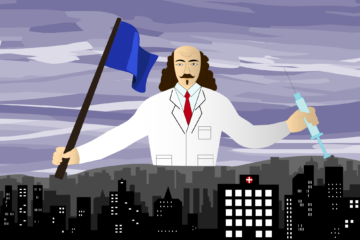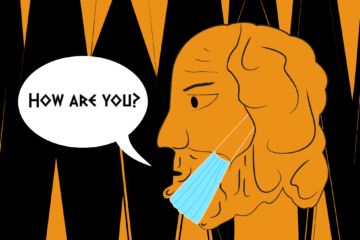Liberty has been the buzzword for the last centuries. Throughout this time, we have neither managed to achieve it, nor rid ourselves of it. Whenever we attempt to go in either direction, we become insecure about our identity as well as our survival. And so, we always end up making a quick return to the fantasy which liberty beholds.
Goods, Capital, Services…. and People: the EU’s Freudian slip
In the early months after my country joined the EU, pamphlets were circulated in an educational/PR campaign, in which one could read on the fundamental rights that the EU guarantees for its citizens. Based on the ‘Four Freedoms’, the trade-friendly union promises the free movement of goods, capital, services… and people.
As a child, totally oblivious of the fundamental principles of economics, I was confused by the fact that in a text concerned with money and business, suddenly popped up a matter concerning the human essence. For adults living in the real world, it may be obvious that the economy and human freedoms can be so conceptually interlinked, simply because our daily life simply revolves around trade. It therefore seems only natural that our material livelihoods are protected along with our other liberties.
However, what is most risky about this intimate connection is that we end up never asking ourselves whether it is the right to move and speak freely or the right to trade which comes first. In other words, the fundamental (albeit undefinable) values of our society, such as human rights, become inseparable from the rituals that animate them, such as the free market.
Even if we presume the two facets to have historically apparated at the same time, the question would still remain as to whether in our society they can exist independently from each another.
But the scope of this essay is not to answer this chicken-egg question in black and white. On the contrary, it will seek to demonstrate that an honest attempt of publicly discussing the matter would uncover several fragile fantasies on which our society is built. The unravelling would be nothing short of a hazard to the thin veils securing the inconsistencies of the very liberties we all enjoy.
The pendulum of liberty and security
The relation between the ‘divine’ values of a society and the rituals is thus enmeshed in a deeper security dilemma: avoiding a dangerous critique of the shortcoming of fundamental values, we instead participate in the rituals that emulate their unyielding presence. Since the values of our society are varying shades of ‘liberty’, we engage in trade and movement and ignore the inherent injustices so that liberty can remain symbolically alive. For example, we pretend to move freely, and ignore the prerequisite of having the right documents issued by the state… we pretend to participate in a market of free atomic choices, and ignore the inequities which persons and communities must endure… and so on. The whole point of rituals is thus none other than security. And it is precisely here that the age-old impossibility of a compromise between liberty and security can be located.
“Man is born free”
The liberal humanist championing human rights would answer the above dilemma with the following allegory:
Human individuals have their own ambitions and dreams and are endowed with a mind that enables them to pursue such dreams. But as each endeavours to fulfil their destinies, they also cross paths with other individuals who also have their own destinies, thus threatening each other’s liberty. At this point, the choice is to either settle that encounter in battle, or to cooperate – i.e. to sign a social contract – to the barest minimum, thus bequeathing security to everyone. Cooperation here remains justifiable for as long as the freedoms of each individual are not infringed, or to put it better, for as long as each has an equal limitation of their original liberties.
Simply put, in this paradigm, any form of social cooperation, including trade, is considered to emanate from the given individual freedoms.
The life of the solitary man is “nasty, brutish and short”
Now let us consider the obverse argument which also can also appear obvious in as long as we accept its starting premise:
Humans, each anxious about their personal survival, straight off do not trust the motives of others. Therefore, in such state of paranoia, the first and most urgent objective is to not be killed, attacked, cheated, or harmed in any way by that suspicious other. Coming across other people would therefore mean that the sense of security once enjoyed is suddenly threatened, and the result is (other than direct conflict) a social contract whereby we guarantee liberties to each in order to prevent security dilemmas from escalating into violence.
Social order is a pendulum escaping commitment to fixed values
It is important to note that in the second scenario presented, liberty is a secondary value that emanates from the fundamental security needs: in this paradigm, we initiate cooperation, not to enhance or secure innately-possessed freedoms, but rather to contain each other in newly-created co-dependent liberties so that war becomes less profitable in the individuals’ calculated risks.
Therefore, what is important to note for the second paradigm, is that individuals do not give up some a priori natural liberties in exchange for security (as proposed by social contract theorists). What rather happens is that we construct and give each other freedoms we did not have before (be it in terms of trade, movement or expression), in order to establish a functional social contract.
My point here is not to advocate one paradigm or another. In fact, both are being shown to possess a similar logic of compromising pragmatism towards individual rights. The argument being presented is rather that the two positions are circular narratives that society adopts in different stages, depending on which social issues become most pressing (i.e. securitised) in social discourse at that point.
In the first scenario, individual liberties are said to clash, due to which individuals erect securities in order to protect liberties…at the cost of the original liberty (by now the cyclical logic should be clear).
In the second scenario, due to individual security concerns, humans construct liberties in order to establish security…at the cost of total security (once again).
Therefore, it seems that whatever value humanity establishes, it would require another conflicting value that seeks to solve the impossibility of the first. We cannot imagine unhinged freedom, nor total security, and so we beget something that symbolises their symbolic gap or limitation.
The two paradigms are underpinned by the same self-undermining logic, in which liberty can never exist as a stand-alone self-sufficient essence of humankind. It can however persist as a fantasy within a structure that we all sign up for. It is not to deny that humans desire liberty (or security), but to affirm that nevertheless, individual liberty is a benefit that we obtain from the necessary adherence to the terms of the contract. In any other society, the ideological fantasy would have been divine salvation, military glory, or any unattainable sublime ideal that can sustain the insatiable ideological desire. For the time being, ours is obsessed with elusive liberty.
Given the contrasting and conflicting paradigms, the only obvious thought that remains is that our beliefs on cooperation – i.e. on society – are underpinned by a deeply paradoxical kernel: as the social mood alternates between the two, an overarching tension between individual liberties and collective demands (i.e. securitisation) reveals itself.
Terrified of Titans, Paranoid about Leviathans
The politico-existential question that thus keeps arising is: does state security exist in virtue of my freedoms, or do my freedoms exist as an extension of the security provided by the state? This centuries-old question, over-simplified by the dichotomy of freedom versus security, is what once again split opinions on COVID health-measures in Western Liberal Democracies.
The paradox of such a system is well-highlighted by a tension between Rousseauian and Lockean social contracts: on the one hand we have a democratic people’s sovereignty which, in order to make any claim, must invoke a unitary constituent power (“the singular people has spoken”). Such position is one stock exchange shy of a totalitarian ‘General Will’ that can even force the people to be free (or vaccinated). On the other hand, we then encounter the radical liberal claim for an almost sacred individual autonomy that may not be infringed by the collective will.

The paradox of liberalism is located in the mere free act by which we choose to close ourselves behind walls that protect us from the Titan, at the mercy of the Leviathan’s wrath. We are trapped between the outer wall of wilderness and the inner wall of the citadel. That is, trapped in our free choice.
Given that the two realms exist in constant friction, any attempt at consolidating the ‘common good’ inevitably trickles as a limitation of the self-determination of individuals, and vice-versa.
We all know ad nauseam that our society claims individual rights and liberties to be at the core of its values. However, we must further ask what exists in the dimension of the social contract. That is, what are the demands it places on these same individuals in the name of the collective securitisation of that same liberty?
This is the part where most liberal activists stumble in an ideological cognitive dissonance. Their given explanation is a circular empty claim: the reason why we, as individuals, group up in a commonwealth, is to secure better the rights of the individuals, which are necessary in order for our society to thrive, so that it may better protect individual rights for the sake of a thriving society…
The Fetish of the Commonwealth: Why we participate in Liberal ideology
What I now propose is that while logically-speaking, the argument is indeed circular, in ideological terms, it is not. This is because an implicit way out of the circle is found in the last statement that ‘our society must thrive’: with this statement, the commonwealth is ascribed an agency, a life of its own, and a purpose to fulfil – even if that purpose is intended towards the individuals. And thus, the commonwealth, or the state, is born… as a fetish: the state is an animation of the individual’s paradoxical relationship with the collective, and to it we can now transfer all the unsolvable contradictions that arise among interacting individuals.
The state, as a formalised commonwealth, becomes the repository of our grievances and litigations. A carefully planned bureaucracy, it performs the rituals of declarations, hearings and reconciliation, and the purpose of the rituals is none other than to reanimate the phantasmatic Leviathan. Rule of law is in this sense none other than the individual’s subjection (as in both becoming a subject, and submitting) to the fetish. In a court you can even sue the state itself, which will reimburse you with money that it prints and that you support through more rituals of monetary consumption.
In such an order, most citizens can choose to ignore many shady injustices, simply because they do not fall under their competences or capacity of understanding. In pundits we trust everything and choose not to look into the darkness. In this manner, the room for politicising injustices is greatly diminished. Naturally, for the fetish to work best, from time to time, we catch it red handed in order to demonstrate that the wheels of justice are turning; a pseudo-politicisation.
The crucial point of fetishism is that the thing – the commonwealth – becomes established as a thing in and for itself. In this manner, injustice can be blamed on the commonwealth, and justice again reclaimed from it. Ultimately, in the case of our contemporary society, our individual liberties can remain at a distance from the social paradoxes. We are allowed to not see the systemic paradoxes in human interaction and instead simply see the state as an institution with systemic injustices. Liberty is thus allowed to persist as a virtually achievable – yet practically unattainable – fantasy which exists in a circular relation with the fetish.
But if the commonwealth is a mere animation, why do we keep it materially active and alive? Because by not doing so, the social contract itself would dissolve into a social void, meaning that our neighbours would suddenly become sui juris cow boys, to everyone’s detriment.
In simple terms, whenever we say ‘protecting individuals from the state’, we are in fact saying ‘protecting individuals from each other’. Or more accurately (i.e. in ideological terms), the phrase translates to ‘we are protecting the individuals from the unfaceable schizophrenia by which they need to be a part of and apart from one another’.
The Economy Fetish: How we participate in Liberal ideology
As to the ‘how’, the answer is by participating in all the rituals that keep it alive, as empty as they may be, and as cynical towards them as we may be. In a liberal symbolic order, that ritual is none other than engagement in free enterprise and free trade.
The elusive nature of the liberty fantasy can be well-demonstrated by the biggest fetish of our time, money. Even in our mundane pursuit of money we can see the expression of our ideological desire for liberty: one aspires to accumulate property, acquire passive income, insure their wealth and so on, always under the pretext of securing their livelihood. Yet the maintenance of that security then requires a neurotic engagement with the market, stocks, and any other social contingency, meaning that security again comes at a price – that price being none other than one’s liberty.
With the Economy fetish, the ritual of free trade provides the rites through which we can act as free agents, to the point that that trade becomes an indispensable adhesive that animates a collective whole. (Free) Trade and common good become synonymous, and the next step is for it to be formalised into a State and its laws.
Rituals are walls separating us from the Leviathan in the citadel and the Titan in the wild
It is now much clearer that there was a good reason why the EU pamphlet included individual free movement with economic liberties. It is also clear why the EU’s major achievement is the prevention of senseless nationalist wars by means of market integration.
Simply put, the ritual of engaging in free trade is meant to provide the ritualistic interactions by which we can animate and practice quotidian liberty, for ourselves and for each other. We participate in rituals not because we believe religiously in them, but rather to uphold the security which it supports. Free movement of capital becomes congruent with free movement of people and any dissenter of free trade is thus marked as an enemy of the people.
In a society established on individual liberties, trade is meant to be the glue that holds us together and which defines the realm where all aspirations, hopes and dreams are to be directed. Trade is the common good ‘in itself’.
But, society necessarily remains a pendulum escaping the realities of unhinged freedoms and total security, meaning that we will never choose between the Titan and the Leviathan. The dream of a progress towards freedom, be it in trade or personhood, thus remains a fantasy that both drives and haunts Liberal Democracies.
The second part of the essay, in the context of COVID restrictions, will focus the critique on the ‘libertarian’ side which protests mandatory vaccination and/or restrictions under the banner of individual liberties. The argument is not public health oriented, but rather seeks to show in further detail how the resistance to restrictions is rooted in a philosophical handicap of liberal democracy itself.



0 Comments